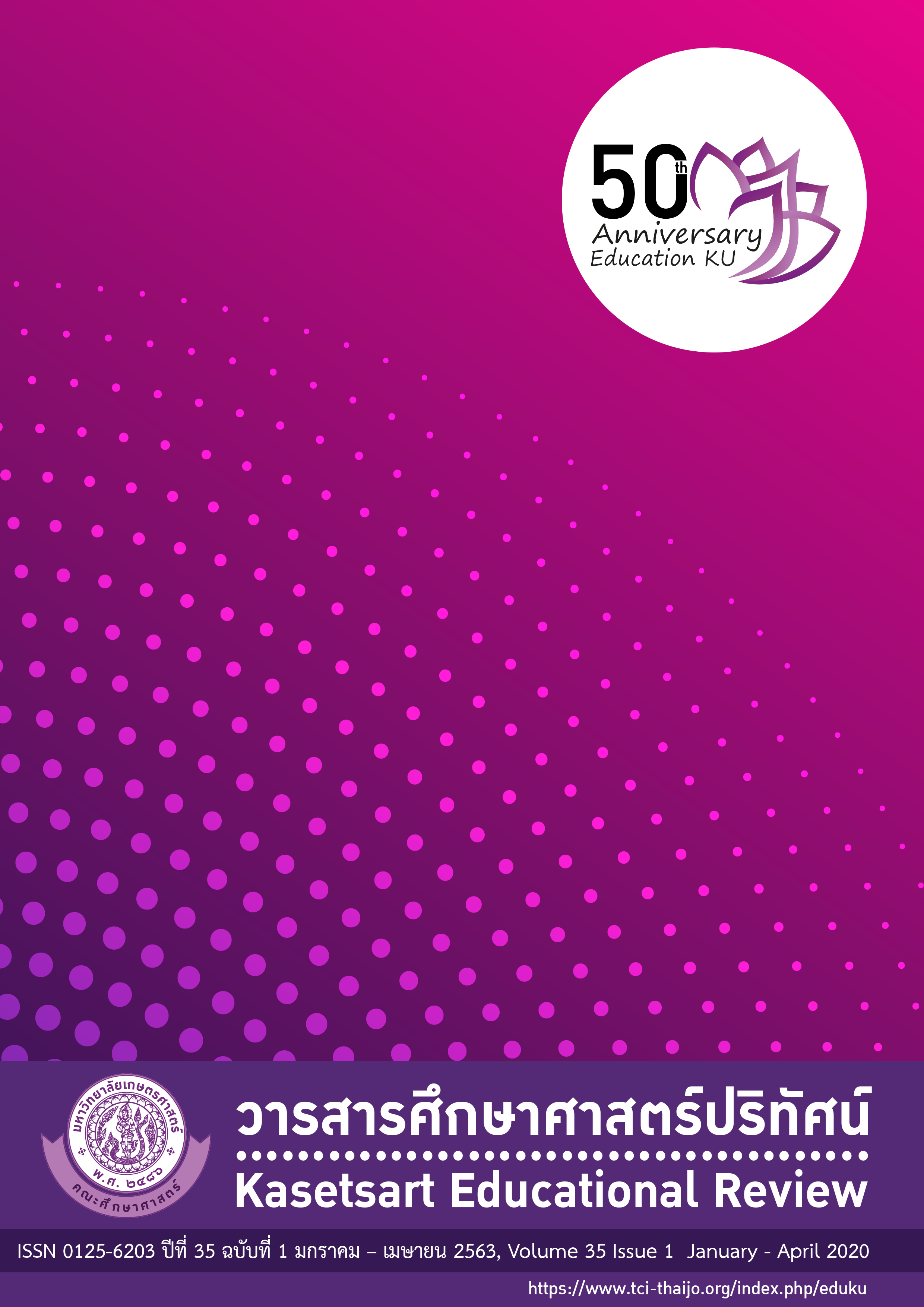การศึกษาความเข้าใจเกี่ยวกับวิธีการทางวิทยาศาสตร์ของนักศึกษาครูวิทยาศาสตร์ที่ผ่านกิจกรรม การเรียนรู้โดยใช้วิจัยเป็นฐาน
คำสำคัญ:
วิธีการทางวิทยาศาสตร์, นักศึกษาครูวิทยาศาสตร์, การเรียนรู้โดยใช้วิจัยเป็นฐานบทคัดย่อ
การเรียนวิทยาศาสตร์ให้ประสบผลสําเร็จนั้น ผู้เรียนจําเป็นจะต้องเข้าใจวิธีการทางวิทยาศาสตร์เพื่อให้ สามารถนําวิธีการดังกล่าวไปใช้ในการสืบเสาะหาความรู้ อย่างนักวิทยาศาสตร์ได้ ในงานวิจัยนี้รายงานผลการศึกษา ความเข้าใจเกี่ยวกับวิธีการทางวิทยาศาสตร์ของนักศึกษา ครูวิทยาศาสตร์จํานวน 44 คน ที่ได้รับการสอนด้วย กิจกรรมการเรียนรู้โดยใช้วิจัยเป็นฐาน ในการวิจัยครั้งนี้ใช้ วิธีการวิจัยเชิงคุณภาพ เครื่องมือวิจัยที่ใช้คือแบบสอบถาม แนวคิดเกี่ยวกับวิธีการทางวิทยาศาสตร์จํานวน 1 ข้อ ผลการวิจัยวิเคราะห์ข้อมูลแบบอุปนัยโดยใช้วิธีการให้รหัส ตีความ และการหารูปแบบ ผลการศึกษาพบว่าสามารถ จําแนกความเข้าใจเกี่ยวกับวิธีการทางวิทยาศาสตร์ของ นักศึกษากลุ่มตัวอย่างได้เป็น 7 รูปแบบ ทั้งนี้นักศึกษาส่วน ใหญ่ (ร้อยละ 77.2) มีความเข้าใจเกี่ยวกับวิธีการทาง วิทยาศาสตร์ที่ถูกต้อง โดยแบ่งความเข้าใจดังกล่าวเป็น 2 กลุ่ม คือ กลุ่มที่เข้าใจว่าการสืบเสาะหาความรู้ต้องมาจาก การทดลองอย่างเดียวกับกลุ่มที่คิดว่าอาจจะได้มาจาก หลากหลายวิธี สําหรับนักศึกษาที่ยังคงมีความเข้าใจ คลาดเคลื่อนมีร้อยละ 20.4 และมีจํานวนเพียงเล็กน้อยที่ไม่ สามารถตีความแนวคิดได้อยู่ร้อยละ 2.3 ผลการวิจัยนี้ สะท้อนให้เห็นว่ากิจกรรมการเรียนรู้โดยใช้วิจัยเป็นฐานได้ ก่อให้เกิดการเรียนรู้ที่เปิดโอกาสให้ผู้เรียนได้ใช้วิธีการทาง วิทยาศาสตร์ในการแสดงหาความรู้ด้วยตนเอง
เอกสารอ้างอิง
American Association for the Advancement of Science (AAAS). (1967). Science – A Process Approach. Washington, DC: AAAS.
Bell, S. (2010). Project-Based Learning for the 21st Century: Skills for the Future. The Clearing House: A Journal of Educational Strategies, 83(2), 39-43.
Bybee, R.W., Taylor, J.A., Gardne, A., Scotter, P.V., Powell, J.C., Westbrook, A. & et al. (2006). The BSCS 5E Instructional Model: Origin and Effectiveness. Colorado Spring: BSCS.
Chamrat, S., Yutakom, N., & Chaiso, P. (2009). Grade 10 Science Students's Understanding of the Nature of Science. KKU Research Journal, 14(4), 360-374. [in Thai]
Chema, B., Panomrak, P., Seanyot, P., Nakpol, M., & Chatmaneerungcharoen, S. (2017). The Ability of Grade 5 Student's Scientific Method. Kasetsart Educational Review, 32(2), 41-44. [in Thai]
Coil, D., Wenderoth, M. P., Cunningham, M., & Dirks, C. (2010). Teaching the Process of Science: Faculty Perceptions and an Effective Methodology. CBE life sciences Education, 9(4), 524-535.
Faikhamta, C. (2012). Pedagogical Content Knowledge for Teaching Nature of Science. KKU Research Journal, 2(2), 233-260. [in Thai]
Faikhamta, C. (2016). PSMT Pre-Service Science Teachers’ Understandings of Nature of Science. Journal of Education, Prince of Songkla University, Pattani Campus, 27(2), 21-37. [in Thai]
Hogan, K., & Berkowitz, A. R. (2000). Teachers as Inquiry Learners. Journal of Science Teacher Education, 11(1), 1-25.
Howes, E. V. (2008). Educative Experiences and Early Childhood Science Education: A Deweyan Perspective on Learning to Observe. Teaching and Teacher Education, 24(3), 536-549.
Keil, C., Haney, J., & Zoffel, J. (2009). Improvements in Student Achievement and Science Process Skills Using Environmental Health Science Problem-Based Learning Curricula. Electronic Journal of Science Education, 13(1), 1-18.
Ladachart, L. & Ladachart, L. (2016). Pre-service Biology Teachers’ Understandings about Nature of Scientific Inquiry. Journal of Learning Innovations Walailak University, 2(1), 24-44. [in Thai]
Pitiporntapin, S. (2013). Developing and Following up Thai Pre-service Science Teachers’ Competencies for Science Communication. Journal of Research Unit on Science, Technology and Environment for Learning, 4(1), 25-37. [in Thai]
Prasertsan, S. (2012). Research-Based Learning: A New Learning Paradigm of Thailand Education. Bangkok: The Thailand Research Fund. [in Thai]
Vasinayanuwatana, T., Faikhamta, C. (2018). Pre-service Science Teachers Understanding of Inquiry. Princess of Naradhiwas University Journal of Humanities and Social Sciences, 5(special), 62-72. [in Thai]
Wanaek, A., Yutakom, N., & Veerapaspong, T. (2013). Science Student Teachers’ Understanding and Teaching Practices of Inquiry Approach. Kasetsart Journal of Social Sciences, 34, 456-470. [in Thai]
Wichadee, S. (2011). Education in the New Paradigm: Research-based Learning. Excusive Journal, 31(3), 26-30. [in Thai]
Wilke, R. R., & Straits, W. J. (2005). Practical Advice for Teaching Inquiry-Based Science Process Skills in the Biological Science. The American Biology Teacher, 67(9), 534-540.
Wilson, K. J., & Rigakos, B. (2016). Scientific Process Flowchart Assessment (SPFA): A Method for Evaluating Changes in Understanding and Visualization of the Scientific Process in a Multidisciplinary Student Population. CBE life sciences education, 15(4), 1-14.
Yew, E. H. J., & Goh, K. (2016). Problem-Based Learning: An Overview of Its Process and Impact on Learning. Health Professions Education, 2(2), 75-79.
Yutakom, N. (2000). Project-Based Learning. Kasetsart Educational Review, 15(2), 35-46. [in Thai]
ดาวน์โหลด
เผยแพร่แล้ว
ฉบับ
ประเภทบทความ
สัญญาอนุญาต
บทความทุกบทความเป็นลิขสิทธิ์ของวารสารคณะศึกษาศาสตร์ มหาวิทยาลัยเกษตรศาสตร์ วิทยาเขตบางเขน
วารสารศึกษาศาสตร์ปริทัศน์ (Kasetsart Educational Review)






